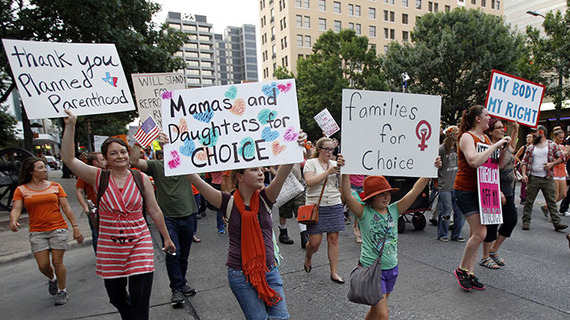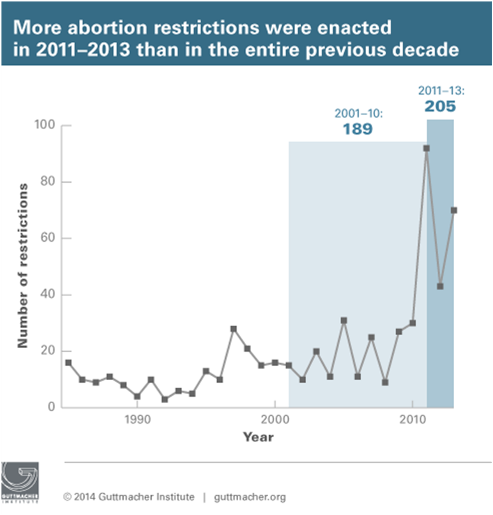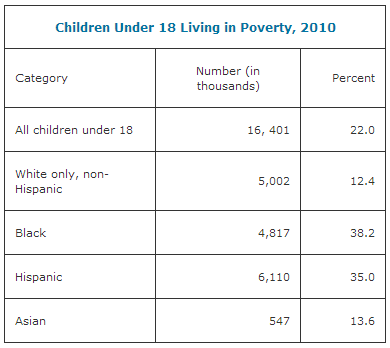I grew up learning from a very young age what it means to be a feminist. My mother's generation of women saw the rights of women to their own bodies granted with Roe v. Wade in 1973, and have since fought many battles for women's equality on both personal and professional levels.
Roe v. Wade was passed over four decades ago, and yet women in this country are still having their reproductive rights questioned, infringed upon and violated by mostly old, white men, who have no concept of the decision they are trying to make for us all.
In 2013 alone, 70 different restrictions on reproductive rights were passed in 22 different states. We've had more laws restricting reproductive rights pass in this country in the past three years than we had in the entire decade of 2000 - 2010. Despite this, the rate of unintended pregnancy in low-income women and in women of color at all income levels has been rising.
Regardless of the explanations that are given for these kinds of laws in official statements, the intent is to strip women (especially poor women and women of color) of their rights in favor of one viewpoint that is ubiquitous with one religious perspective. In the 21st century, we are still living in a patriarchal theocracy, where men in power will even bypass the democratic process to maintain their frantic control over women's bodies.
Women seeking abortions are painted to be fickle, flighty, loose women with no moral integrity. Not only is this categorization of women absurd and completely dismissive of the complicated and diverse situations that lead women to seek abortions, it also begs the question: If it were true, why would anyone in their right mind be in such a hurry to give said women the responsibility of shepherding a human life into the world in the first place?
More than this, however, is the inherent conclusion that an unborn child holds more value as a human being than a grown woman. We already fail as a nation to adequately care for every American child. As of 2010, there were 1.6 million homeless children in the U.S., another 1.3 million are living in foster care, and a staggering 16.4 million children are living in poverty. That is 22% of all American children under the age of 18, by the way. Personally, I find these figures absolutely shocking.
The rates of teen pregnancies and access to adequate prenatal care paint an equally dismal picture. There are over 329,772 teenage girls (ages 15-19) giving birth in U.S. each year, and nearly 1 million pregnant women receive late or no prenatal care. How are we to force women to bring more children into this world when there are thousands of children lacking care and a viable future?
More troubling to me personally than any of these statistics, and they are deeply troubling, is the archaic idea being perpetuated by social conservatives, patriarchs, misogynists and sexists that a woman's primary role in life is only limited to her capacity to make babies, and that any aspirations, talents and contributions she might have in store for her are secondary to her function as a baby-making machine.
Women have their own right to life, liberty and the pursuit of happiness. To have a child is an 18-year commitment that no one should take lightly, much less men, who have little to no personal stake in abortion rights at all. To force a woman to bear a child, even if she gives said child up for adoption, is an unspeakable assault on her body, her mental state and her rights as a human being.
Almost all of the responsibility of pregnancy and childbirth are placed on women, but we are granted such a marginal role in the decision-making. We are fighting for our human rights in a nation that purports the be the most free, most advanced democratic nation in the world. We are certainly not free when the most personal decision a woman can make for herself is taken away from her and her doctor and put in the hands of a handful ignorant, irresponsible, conniving and privileged men, who have neither the right nor the adequate knowledge to even make a judgment in this area.
Better reproductive care actually leads to a decrease in abortions, and if you think about it, that makes sense. If women have access to reproductive health care and contraceptives, they are more likely to practice safe sex and make educated decisions about family planning. These laws that have restricted women's access will likely lead to more unsafe abortions obtained out of desperation and a lack of a viable alternative.
No one likes abortion. It's not something anyone advocates for because they think it's a wonderful thing. It might make you sad to think about it, and indeed the reality of going through it I would imagine is heartbreaking. I understand the emotional resistance to abortion. I get it. It's not a valid reason, however, for limiting the control a woman has over her own body. More than that -- we, as a society, cannot legislate feelings.
Our country doesn't judge and persecute men for seeking vasectomies. Health providers and employers don't try to find sneaky ways to guarantee Viagra won't be covered under their policies. We don't even have a commercially-available form of contraception for men, although there are options in advanced clinical trials. Why aren't we critical of men's sexuality in the same way we constantly scrutinize and blame women?
What I've always struggled to understand is this: why are men so afraid of women controlling their own bodies? Why is there such a deep-rooted belief held by many that a woman's thoughts, feelings, opinions and actions about her own life simply don't matter?
What is so scary about women?
____
All statistics and figures provided courtesy of the Administration for Children and Families, the National Poverty Center and the Guttmacher Institute.
Image: Popular Resistance



